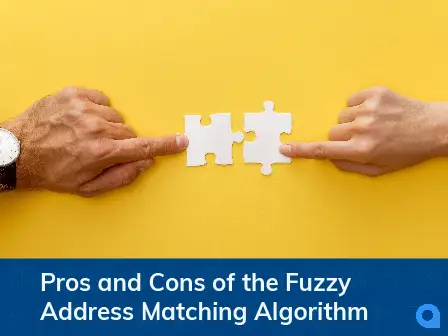
Typos, typoes or typo's?
No matter how you spell the word, typos are a problem. Even the most accurate typist occasionally misspells a word, leaves off a letter at the end, or just types a different word than intended.
Typos in a text to your friend aren't a big deal. They'll figure out what you mean using context clues. But in a business data scenario, if you're following the logic of traditional address matching, where an address is either an exact match or not a match, you can't account for different formats or misspellings.
Exact address matching methods won't catch common mistakes like:
- Spelling Mistakes
- Incorrect Type (Street vs. Road)
- Abbreviations
- Synonyms: Floor vs. Level -Unit, Flat, or Apartment
- Swapped Letters
- Sounds Like
- Out-of-Correct-Order
However, fuzzy logic address matching excels at handling common address mistakes.
Fuzzy Matching (also known as Approximate String Matching) is a technique that helps identify two elements of text, strings, or entries that are approximately similar but not 100% the same.
Traditional address matching logic is binary. An address either matches exactly, or it doesn't.
Fuzzy logic indicates the degree to which a statement is true, and can help identify errors like the list above. However, there are nuances to fuzzy matching. Being "too fuzzy" creates matches for addresses that deserve to fail, resulting in false positives.
To avoid this, you can choose your tolerance level, or what degree of similarity you'll accept, from the fuzzy matching algorithm. For example, a provider can set a threshold of 0.8 and then test and adjust as needed. The goal is to ensure that minimal false positives get through, while still returning results and allowing for misspellings, errors, and varying formats.
Here at Smarty, we have a multi-stage process that attempts to find a match using a reliable matching engine. If it doesn't find a match, that address is next run through more aggressive matching processes. By only running failed addresses through additional stages, match rates increase with minimal risk of matching addresses that deserve to fail.

Pros of Fuzzy Address Matching
Fuzzy logic offers several advantages compared to traditional address matching. Let's look at a few of them.
1. Determining the Likelihood of a Full Match
Fuzzy matching predicts the likelihood of a full match. Depending on how high the probability of a match is, you can decide to consider those two addresses a match or adjust your tolerance settings. Your match probability scores are also a good indicator of your data quality.
2. Handling Misspellings, Formatting Errors, and Phonetic Variations
People often spell addresses based on how the street name sounds. Traditional address matching won't catch that Fontainebleau Drive is the same street as Fountainblue Drive or Fontinblow Drive. Fuzzy logic is much better at handling misspellings and minor differences because it looks at how many characters are different.
Without the ability to easily pair up the same address, written in two different ways, it's harder to deduplicate address data and merge your records.
3. Distinguishing Unique Address Information
You can program your exact matches to accept some small, common variances in standard formatting (i.e., street vs. st, road vs. Rd, etc.). However, that won't help with non-standard address information or street names. You can't sit there and program in ten different spellings of Fontainebleau! Fuzzy logic allows you to set rules for address standardization, correcting address information like street names to match with greater accuracy.
Cons of Fuzzy Address Matching
Nobody's perfect, and neither are fuzzy matching algorithms. Depending on your tolerance level, you might not catch the craziest misspellings or wacky formatting errors. However, fuzzy address matching addresses many weaknesses demonstrated by traditional address matching.
Powered by fuzzy address matching, better match rates can increase your revenue by providing more usable address data and minimizing time spent on manual validation.
Want to know more about how accurate address data can help your business? Download our free ebook, 4 Steps to Unlocking Latent Revenue and Driving ROI with Your Address Data.

 Sawyer Hendrickson
Sawyer Hendrickson Kiana Andrewsen
Kiana Andrewsen